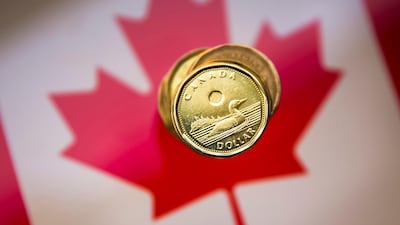Canada’s long-term foreign currency debt rating was downgraded by Fitch Ratings, which cited the deterioration in its public finances resulting from the Covid-19 pandemic.
The country is expected to run a bigger government deficit this year and emerge from the recession with much higher public debt ratios, Fitch said on Wednesday. It cut the country’s rating one notch to AA+ from AAA.
Canada still has a AAA rating with S&P Global Ratings, making it only one of two countries left in the Group of Seven to hold that status; Germany is the other. Moody’s Investors Service also gives Canada its highest rating.
“The question is what took so long. Canada’s excessively leveraged national balance sheet has looked a lot like China, Italy and Greece for quite a while,” said David Rosenberg, founder of Rosenberg Research and Associates and former chief North American economist at Merrill Lynch. “This won’t be the last ratings cut, I can assure you.” He had predicted the downgrade in an April research note that said the “Great Canadian Debt Surge has come home to roost”.
Canada’s national government is on track to post its largest deficit on record in the 2020-2021 fiscal year. The shortfall may reach about 12 per cent of gross domestic product during the year, compared with 1.1 per cent last year, according to the Parliamentary Budget Officer.
“Canada continues to be in a stronger financial position than many other countries in the G7 and G20,” Finance Minister Bill Morneau said in a statement. “We will continue to be fiscally responsible while acting to protect our country and its economy.”
Fitch said in its report that Canada's higher deficit “is largely driven by public spending to counteract a sharp fall in output as parts of the economy were shuttered to contain the spread of the coronavirus”.
It expects the coronavirus response to raise Canada’s consolidated gross general government debt to 115.1 per cent of GDP in 2020, up from 88.3 per cent last year.
The Canadian dollar briefly weakened to a session low, hitting C$1.3618 to the US dollar, before rebounding.
“Markets don’t seem to care, rightly so in my view,” said Derek Holt, an economist at Bank of Nova Scotia.
“Every sovereign is under the same pressure. Ratings are a relative game and even at that there is a long list of more dominant market factors. It’s one agency that stripped Canada of some political bragging rights, but the tangible impact is scant to non-existent.”
For Bipan Rai, head of foreign exchange strategy at Canadian Imperial Bank of Commerce, things may get volatile for the loonie if another agency follows. “The question is who’s next to downgrade? If it’s Moody’s, then there is a risk of portfolio outflows,” he added, noting that Canada’s current account deficit is financed heavily by foreign fund inflows.
The North American economy is set to contract 7.1 per cent in 2020 compared to 1.6% growth last year, according to median consensus of analysts compiled by Bloomberg.
Canada’s government is rolling out a plan of more than C$230 billion (Dh620.9bn) of subsidies, grants and tax referrals in a bid to offset the impact of the pandemic.

